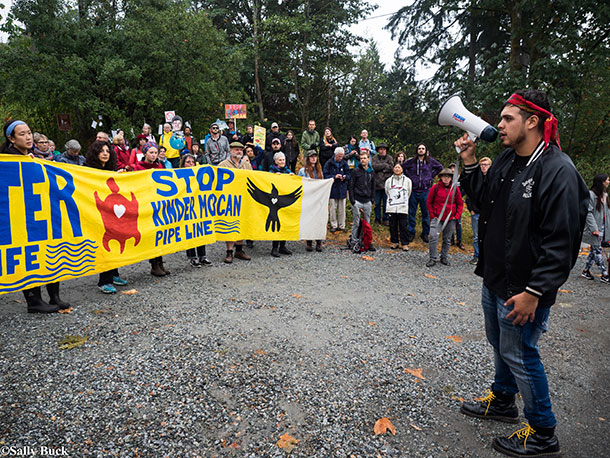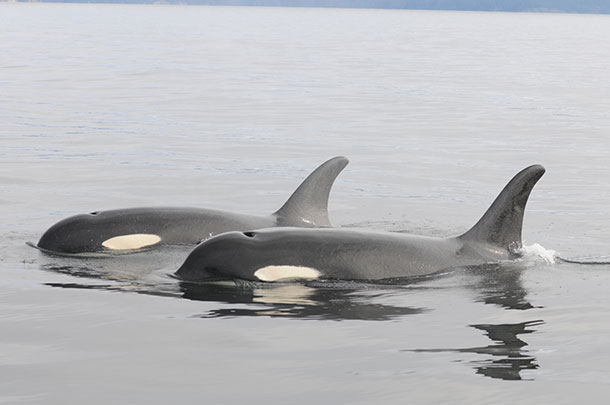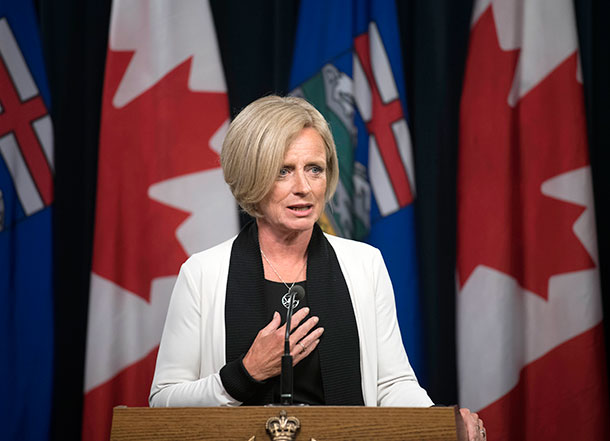Trans Mountain Pipeline Expansion Blocked
Air Date: Week of September 7, 2018

Protestors gather for a March to Stop Trans Mountain Oil Pipeline at the Kwekwexnewtxw Watch House and the Kinder Morgan Tank Farm in Burnaby, British Columbia in August 2018. The pipeline has been heavily protested by First Nations groups and their allies. (Photo: Sally T. Buck, Flickr CC BY-NC-ND 2.0)
Canada’s Federal Appeals Court has blocked the controversial Trans Mountain Pipeline Expansion unless and until the Trudeau government properly consults with First Nations and studies impacts to southern resident killer whales, a process expected to push the project well past Canada’s elections in 2019. Rather than see the expansion project die for lack of private capital the Canadian government has purchased the Trans Mountain Pipeline for $4.5 billion. Host Steve Curwood spoke with reporter Laura Kane of The Canadian Press.
Transcript
CURWOOD: From PRI and the Jennifer and Ted Stanley Studios at the University of Massachusetts Boston, this is Living on Earth, I’m Steve Curwood.
For years activists have fought the Trans Mountain Pipeline Expansion Project in western Canada, a move that would triple the amount of carbon heavy oil sands crude it could carry. In recent months indigenous groups and their allies intensified their demonstrations, chanting, singing, and chaining themselves to a key entrance, as they faced arrest in droves. Pipeline owner Kinder Morgan finally yielded to the protests and moved to cancel the project. But then the Trudeau Administration stepped in to buy the pipeline for $4.5 billion Canadian dollars, vowing to move ahead with the expansion in the name of “the national interest” of creating jobs and boosting the economy. Now the Federal Court of Appeals has blocked construction, ruling that the Canadian government cut corners in its review of project plans. Reporter and editor Laura Kane writes about the pipeline for The Canadian Press. Welcome to Living on Earth!
KANE: Thank you so much for having me, Steve. I'm happy to be here.
CURWOOD: What are we talking about in terms of capacity? How important is this to the folks who are in the oil sands business?
KANE: It's very important to the industry, particularly in Alberta's oil sands which has been hit hard by lowering oil prices where a lot of workers have lost their jobs and been laid off in recent years. This project was really seen as a way to get some of those workers up and moving. It was also seen as a way to get more oil from Alberta's oil sands to tidewater, so that it could be shipped overseas to Asian markets. Currently a lot of Canadian oil is going to the US, and Canadian industry folk and political leaders argue that we're not getting as good a price as we could be with Asian markets that we are from American. And so this project was seen as crucial to get the oil to tidewater. It would expand the capacity of the pipeline threefold. So, it would go to about 890,000 barrels of oil a day from Alberta's oil sands and it would increase the number of tankers leaving Metro Vancouver’s port sevenfold. So, that goes from five per month to 34 tankers per month. So, it is a massive resource project that the government has really really wanted to get off the ground, that industry people have really wanted to get off the ground, but that environmental leaders and First Nations leaders in British Columbia have been very much opposed to.
CURWOOD: So, how significant is this court decision?
KANE: It is a game changer in terms of the likelihood of this project getting off the ground anytime soon. It found two fatal flaws in the government's review of the pipeline, which by the way has been going on for years. I mean, this pipeline was first proposed in 2012, it was approved by the government in late 2016, and now we're in 2018. So, this is a very extensive process that has now been sent back to the review phase.

The National Energy board must now consider the impacts of increased tanker traffic from the pipeline on the marine environment, especially the effects on endangered Southern Resident killer whales. (Photo: NOAA Fisheries West Coast, Flickr CC BY-NC-ND 2.0)
CURWOOD: So, how much could the project be delayed by this court decision?
KANE: It could be delayed for years. The court ruling found that the government needs to go back and it needs to review the marine shipping effects, so the effects of the increased tanker traffic on the marine environment. We have a very endangered southern resident killer whale population off the coast of BC and Washington State, where there are only 75 of these whales left and the reproductive potential is quite low, so environmental leaders argue that this project would have a significant impact on these whales. So, going back, having to reopen the National Energy Board review and look at how it would impact the marine environment and the whales -- it's going to possibly require some changes to the design of the pipeline itself and the shipping route in order to avoid impact on the whales. So, that process could take a very long time.
CURWOOD: And what about the other part of their decision, I gather it involves First Nations, indigenous folks.
KANE: That's right. So, the very final phase of indigenous consultation was found to be flawed. The court said that the government essentially sent note takers to go out to the first nations that were opposed to the pipeline, record their concerns, take them back to the government. But they didn't do anything about those concerns. And they're pretty significant and specific concerns that could be addressed if the government was willing to do so. So, for example, there's a First Nation in central BC whose aquifer, its main source of drinking water, is crossed by the pipeline. So, they're very concerned about what could happen to their drinking water if something goes wrong with the pipeline. This is a concern that the government could have addressed and the court says should have addressed, but didn't. So now they need to redo all that consultation with all of the indigenous groups along the pipeline route and really do it in a meaningful way where they listen to the concerns and provide accommodations where necessary. So, that process could take a very long time.
CURWOOD: So, what is Prime Minister Justin Trudeau now saying about this decision and the way forward?
KANE: So, he has said that he's committed to building the pipeline project, that he wants to move forward in the right way, which is what suggests to me that he is going to follow the court's orders on this and redo the indigenous consultation and the part of the review that requires them to look at marine tanker traffic. It seems like he's trying to put on sort of um -- a brave face in light of how devastating this decision really is to the pipeline project. He's trying to reassure Canadians that the government's committed to this project moving forward, but he's in a very difficult spot. He partnered with the government of Alberta on this and the government of Alberta is furious that this project isn't moving ahead.

Following the Canadian federal appeals court ruling to strike down the approval of the Trans Mountain Pipeline, Alberta Premier Rachel Notley said the province will withdraw from the federal climate plan until Prime Minister Justin Trudeau can get the project back on track. (Photo: Premier of Alberta, Flickr CC BY-ND 2.0)
CURWOOD: What are the chances that this pipeline will eventually get built? I mean, you say there’s delays, probably another couple of years.
KANE: If it were a private company operating this pipeline, I think a lot of experts would say it's dead, it's over, it's not going to happen. In fact, Kinder Morgan wanted to walk away months ago because of that concern, but the government of Canada has now purchased the pipeline so it's committed to getting this done. It believes it's in the national interest. But we're not likely to see this process actually completed, this redoing of the indigenous consultation and the environmental review, done by the federal election in fall 2019, and who knows what the price of oil is going to be in 2020, 2022. I don't know how the government gets out of building it eventually, when they have purchased it for $4.5 billion dollars, not including construction costs. They're determined to see it done. It's going to hinge on who wins the next federal election, what the environment looks like in 2022, and if they're willing to kind of bulldoze through protests that are likely to continue for years to come.
CURWOOD: So, the elections are coming up. How does this decision affect what could happen with the elections?
KANE: I mean I think it could really hurt him. The Liberal government won in 2015 on a wave of actually indigenous voters, of people in British Columbia in particular who were willing to vote Liberal because he made a lot of promises around Indigenous reconciliation and environmentalism. So, I think a lot of people who voted Liberal in the last election have been very disappointed with his government's purchase of this pipeline and its failure to consult First Nations adequately on the pipeline. That said, are there people who are more conservative leaning who might be willing to vote Liberal? It's hard to say. We also have a conservative party in Canada that's more on the right of him. So, the Liberal Party in Canada is typically the centrist party. So, you really do need to gather people from both sides, and I don't see him being able to do that from the left.
CURWOOD: By the way, if this pipeline were to be expanded, to triple the sale of these oil sands into the world market, what does that do to Canada's commitment under the Paris Accord?
KANE: I don't see how they can meet it. They have said that their carbon pricing plan will offset, so they're trying to get carbon pricing in all provinces, but provinces have started to back away from the agreement. In fact, Alberta -- just last week after the court decision came down -- said we're not going to agree to a tax on carbon until you get this pipeline built. So, it looks like that plan is falling apart. The government continually says that they're trying to grow the economy while protecting the environment. But the reality is, if this pipeline project were to proceed, I think most experts agree that we could not meet our commitments under the Paris Agreement.

Laura Kane is a reporter and editor for The Canadian Press. (Photo: Laura Kane)
CURWOOD: To what extent are the First Nations people who had opposed this Trans Mountain Pipeline expansion celebrating this decision?
KANE: Certainly on the day the decision came down the indigenous groups who fought the project were so joyful. It was a really powerful moment. They stood on the banks of Burrard Inlet, which stands to see you know tanker traffic increase sevenfold if the project proceeds, and they said we're winning. And we fought this for all Canadians, we fought this for the world. We could have negotiated millions for support of this project and instead we protected the land and the water for you. So, that was certainly the mood last week and we'll just have to wait and see whether the project does in fact proceed at some point in the future.
CURWOOD: Laura Kane is an editor and reporter with The Canadian Press. Thanks so much for taking the time with us today, Laura.
KANE: Thank you so much for having me. I appreciate it.
Links
The Star | “Trans Mountain expansion could be delayed for years by court decision: experts”
From the LOE archives: “A Pipeline Eco Engineer Protests”
Listen to another LOE interview: “Canada Buys Tar Sands Oil Pipeline”
Global News | “Timeline: Key dates in the history of the Trans Mountain pipeline”
Living on Earth wants to hear from you!
Living on Earth
62 Calef Highway, Suite 212
Lee, NH 03861
Telephone: 617-287-4121
E-mail: comments@loe.org
Newsletter [Click here]
Donate to Living on Earth!
Living on Earth is an independent media program and relies entirely on contributions from listeners and institutions supporting public service. Please donate now to preserve an independent environmental voice.
NewsletterLiving on Earth offers a weekly delivery of the show's rundown to your mailbox. Sign up for our newsletter today!
 Sailors For The Sea: Be the change you want to sea.
Sailors For The Sea: Be the change you want to sea.
 The Grantham Foundation for the Protection of the Environment: Committed to protecting and improving the health of the global environment.
The Grantham Foundation for the Protection of the Environment: Committed to protecting and improving the health of the global environment.
 Contribute to Living on Earth and receive, as our gift to you, an archival print of one of Mark Seth Lender's extraordinary wildlife photographs. Follow the link to see Mark's current collection of photographs.
Contribute to Living on Earth and receive, as our gift to you, an archival print of one of Mark Seth Lender's extraordinary wildlife photographs. Follow the link to see Mark's current collection of photographs.
 Buy a signed copy of Mark Seth Lender's book Smeagull the Seagull & support Living on Earth
Buy a signed copy of Mark Seth Lender's book Smeagull the Seagull & support Living on Earth

